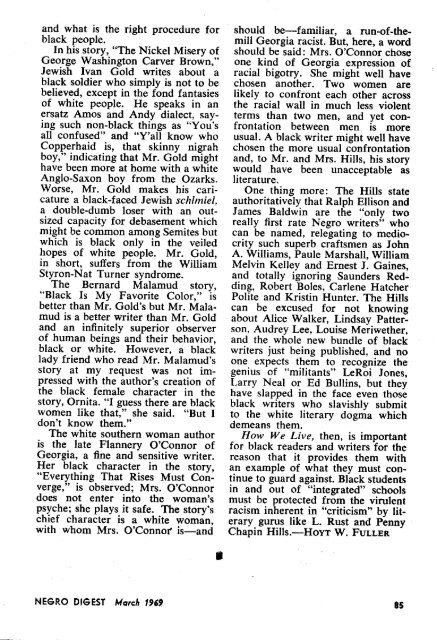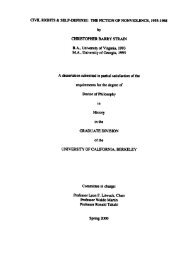Negro Digest - Freedom Archives
Negro Digest - Freedom Archives
Negro Digest - Freedom Archives
You also want an ePaper? Increase the reach of your titles
YUMPU automatically turns print PDFs into web optimized ePapers that Google loves.
and what is the right procedure for<br />
black people.<br />
In his story, "The Nickel Misery of<br />
George Washington Carver Brown,"<br />
Jewish Ivan Gold writes about a<br />
black soldier who simply is not to be<br />
believed, except in the fond fantasies<br />
of white people . He speaks in an<br />
ersatz Amos and Andy dialect, saying<br />
such non-black things as "You's<br />
all confused" and "Y'all know who<br />
Copperhaid is, that skinny nigrah<br />
boy," indicating that Mr . Gold might<br />
have been more at home with a white<br />
Anglo-Saxon boy from the Ozarks .<br />
Worse, Mr . Gold makes his caricature<br />
a black-faced Jewish schlmiel,<br />
a double-dumb loser with an outsized<br />
capacity for debasement which<br />
might be common among Semites but<br />
which is black only in the veiled<br />
hopes of white people . Mr. Gold,<br />
in short, suffers from the William<br />
Styron-Nat Turner syndrome.<br />
The Bernard Malamud story,<br />
"Black Is My Favorite Color," is<br />
better than Mr. Gold's but Mr . Malamud<br />
is a better writer than Mr . Gold<br />
and an infinitely superior observer<br />
of human beings and their behavior,<br />
black or white . However, a black<br />
lady friend who read Mr. Malamud's<br />
story at my request was not impressed<br />
with the author's creation of<br />
the black female character in the<br />
story, Ornita . "I guess there are black<br />
women like that," she said . "But I<br />
don't know them ."<br />
The white southern woman author<br />
is the late Flannery O'Connor of<br />
Georgia, a fine and sensitive writer .<br />
Her black character in the story,<br />
"Everything That Rises Must Converge,"<br />
is observed ; Mrs . O'Connor<br />
does not enter into the woman's<br />
psyche ; she plays it safe . The story's<br />
chief character is a white woman,<br />
with whom Mrs . O'Connor' is-and<br />
NEGRO DIGEST March 1969<br />
should be-familiar, a run-of-themill<br />
Georgia racist . But, here, a word<br />
should be said : Mrs . O'Connor chose<br />
one kind of Georgia expression of<br />
racial bigotry . She might well have<br />
chosen another. Two women are<br />
likely to confront each other across<br />
the racial wall in much less violent<br />
terms than two men, and yet confrontation<br />
between men is more<br />
usual . A black writer might well have<br />
chosen the more usual confrontation<br />
and, to Mr . and Mrs . Hills, his story<br />
would have been unacceptable as<br />
literature .<br />
One thing more : The Hills state<br />
authoritatively that Ralph Ellison and<br />
James Baldwin are the "only two<br />
really first rate <strong>Negro</strong> writers" who<br />
can be named, relegating to mediocrity<br />
such superb craftsmen as John<br />
A . Williams, Paule Marshall, William<br />
Melvin Kelley and Ernest J. Games,<br />
and totally ignoring Saunders Redding,<br />
Robert Boles, Carlene Hatcher<br />
Polite and Kristin Hunter . The Hills<br />
can be excused for not knowing<br />
about Alice Walker, Lindsay Patterson,<br />
Audrey Lee, Louise Meriwether,<br />
and the whole new bundle of black<br />
writers just being published, and no<br />
one expects them to recognize the<br />
genius of "militants" LeRoi Jones,<br />
Larry Neal or Ed Bullins, but they<br />
have slapped in the face even those<br />
black writers who slavishly submit<br />
to the white literary dogma which<br />
demeans them.<br />
How We Live, then, is important<br />
for black readers and writers for the<br />
reason that it provides them with<br />
an example of what they must contime<br />
to guard against . Black students<br />
in and out of "integrated" schools<br />
must be protected from the virulent<br />
racism inherent in "criticism" by literary<br />
gurus like L. Rust and Penny<br />
Chapin Hills.-HOYT W . FULLER<br />
85
















